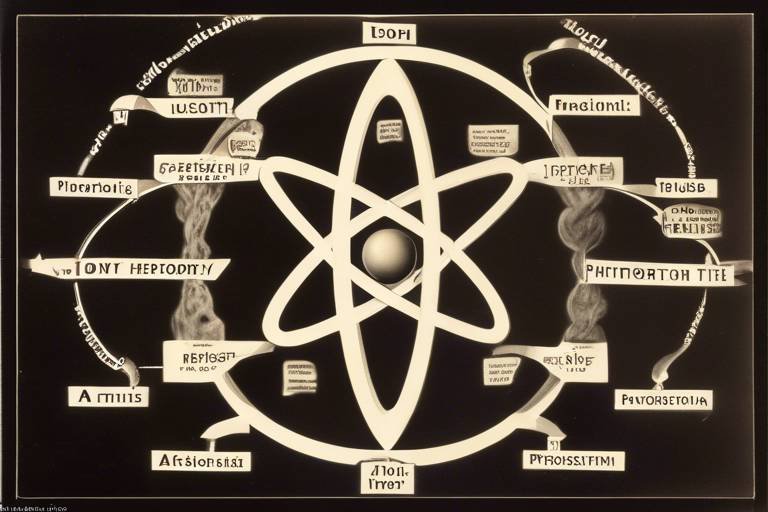Existentialism and its Implications for Scientific Inquiry
Existentialism, often seen as a response to the mechanistic view of the universe, dives deep into the essence of human existence, questioning the very fabric of reality itself. This philosophical movement, which emerged in the 20th century, is not just about pondering the meaning of life; it challenges the foundations of how we perceive and understand the world around us. When we look at scientific inquiry through the lens of existentialism, we uncover a fascinating interplay between human experience and empirical research. This article explores how existentialist themes influence scientific thought, research methodologies, and our understanding of human existence within the scientific framework.
At its core, existentialism emphasizes the importance of individual experience and the subjective nature of reality. Think about it: every scientific endeavor is conducted by humans, who bring their own perspectives, biases, and emotions into the laboratory. This realization prompts us to ask: can science truly be objective? Or is it, in fact, a reflection of the complex tapestry of human existence? By examining the intersection of existentialism and scientific inquiry, we can better appreciate the nuances of both fields, leading to a richer understanding of our world and ourselves.
As we delve deeper into this topic, we will explore the foundational concepts of existentialism and how they challenge traditional scientific methodologies. We will also investigate the ethical implications inherent in scientific inquiry, considering the responsibilities that come with the pursuit of knowledge. Ultimately, this exploration aims to highlight the dynamic relationship between existentialist thought and scientific investigation, opening up new avenues for understanding the complexities of existence.
Existentialism is rooted in the works of several key philosophers, including Jean-Paul Sartre, Simone de Beauvoir, and Martin Heidegger. These thinkers grappled with questions of meaning, freedom, and the human condition, shaping the existentialist movement. Central to existentialism is the idea that existence precedes essence, meaning that individuals define their own purpose and values through their experiences and choices. This perspective is crucial for understanding how existentialism relates to scientific inquiry, as it emphasizes the subjective nature of human experience.
Traditionally, scientific methodologies have prioritized objectivity, often sidelining the subjective experiences that shape our understanding of reality. However, existentialism challenges this notion, advocating for a more nuanced approach that recognizes the importance of personal experience in scientific inquiry. By embracing subjectivity, scientists can gain deeper insights into the human experience, ultimately enriching their research and findings.
Subjectivity plays a significant role in scientific research. Every researcher brings their own background, beliefs, and emotions to their work, which can influence their interpretation of data and outcomes. Existentialism encourages scientists to acknowledge these personal narratives, fostering a more holistic understanding of knowledge. For instance, consider how two scientists might interpret the same set of data differently based on their unique perspectives. By valuing these differences, we can cultivate a more inclusive and comprehensive approach to scientific inquiry.
Personal experiences shape scientific perspectives in profound ways. When researchers draw from their own lives, they can uncover insights that might otherwise remain hidden. This interplay between personal narrative and scientific inquiry not only enriches the research process but also humanizes the often sterile world of science. For example, a scientist studying mental health may have personal experience with the subject, leading them to ask questions and explore avenues that a more detached researcher might overlook.
While striving for objectivity is a noble goal in science, existentialism cautions us against viewing it as an absolute. The complexities of human emotions and experiences cannot be neatly categorized or quantified. By recognizing the limitations of objectivity, scientists can embrace a more nuanced understanding of knowledge that accounts for the rich tapestry of human existence. This shift can lead to more ethical and responsible scientific practices, ultimately benefiting society as a whole.
As we navigate the ethical implications of scientific inquiry through an existentialist lens, it becomes clear that scientists bear a significant responsibility toward society. The decisions they make in their research can have far-reaching consequences, both positive and negative. Existentialism compels scientists to confront these moral dilemmas, fostering a sense of accountability that extends beyond the laboratory. By prioritizing ethical considerations, researchers can ensure that their work contributes meaningfully to the greater good.
Existentialist philosophy invites us to question the nature of scientific knowledge itself. Is it an absolute truth, or is it a human construct shaped by cultural, social, and existential factors? This inquiry challenges the traditional view of science as an objective pursuit, encouraging a more reflective approach to understanding knowledge. By acknowledging that our interpretations of scientific findings are influenced by our consciousness, we can cultivate a richer appreciation for the complexities of existence.
Scientific knowledge is often perceived as a collection of facts and truths, but existentialism posits that it is, in fact, a construct influenced by various factors. Our cultural backgrounds, social contexts, and personal experiences all shape how we understand and interpret scientific findings. This perspective encourages us to question the notion of absolute truths in science, promoting a more flexible and inclusive understanding of knowledge.
In today's rapidly advancing world, the concept of existential risks has become increasingly relevant. These risks, which threaten humanity's survival, require careful consideration in the context of scientific advancements. Existentialism emphasizes the importance of ethical considerations when pursuing scientific knowledge, urging researchers to be mindful of the potential consequences of their work. By fostering a culture of responsibility and ethical reflection, we can navigate the complexities of scientific inquiry while safeguarding our collective future.
- What is existentialism? Existentialism is a philosophical movement that emphasizes individual existence, freedom, and choice, focusing on the subjective nature of human experience.
- How does existentialism influence scientific inquiry? Existentialism challenges traditional scientific methodologies by advocating for the acknowledgment of personal experiences and interpretations in the pursuit of knowledge.
- What are existential risks? Existential risks are threats that could potentially lead to human extinction or the permanent and drastic reduction of humanity's potential.
- Why is ethics important in scientific research? Ethics is crucial in scientific research because it ensures that the pursuit of knowledge does not come at the expense of human welfare and societal well-being.

The Foundations of Existentialism
Existentialism is a philosophical movement that emerged in the 20th century, primarily concerned with the individual's experience in a seemingly indifferent universe. It emphasizes the importance of personal choice, freedom, and the inherent meaninglessness of life, which can be both liberating and daunting. Key figures in this movement include Søren Kierkegaard, Friedrich Nietzsche, Jean-Paul Sartre, and Simone de Beauvoir. Each of these thinkers contributed unique perspectives that shaped existentialist thought, making it a rich tapestry of ideas centered around human existence.
At its core, existentialism grapples with fundamental questions about human existence. It challenges us to confront the absurdity of life and the inevitability of death, urging individuals to find their own meaning in a world that offers none. This quest for meaning often leads to feelings of anxiety and despair, but it also opens the door to profound personal freedom. In a way, existentialism can be likened to a blank canvas; while it may seem daunting at first, it allows individuals to paint their own reality, filled with personal truths and experiences.
One of the most significant contributions of existentialist thinkers is the idea that existence precedes essence. This means that individuals are not born with a predetermined purpose; rather, they create their own essence through choices and actions. This notion is empowering, as it places the responsibility of defining one's identity squarely on the individual. It highlights the importance of authenticity—the idea that one must live true to oneself, rather than conforming to societal expectations.
Existentialism also delves into the concept of absurdism, which posits that human beings are fundamentally driven to seek meaning, yet are met with an indifferent universe that offers none. This conflict can lead to a sense of disillusionment, but it also encourages individuals to embrace their freedom and create meaning in their lives. The existentialist perspective challenges traditional notions of morality and ethics, prompting a reevaluation of how we understand our responsibilities to ourselves and others.
In summary, the foundations of existentialism rest on several key principles:
- Individual Experience: Emphasizes the subjective nature of human experience.
- Freedom and Responsibility: Highlights the importance of personal choice and accountability.
- Absurdism: Explores the conflict between the human desire for meaning and the universe's indifference.
- Authenticity: Encourages individuals to live true to themselves rather than conforming to external pressures.
As we delve deeper into the implications of existentialism for scientific inquiry, it becomes clear that these foundational ideas not only shape our understanding of human existence but also influence how we approach the pursuit of knowledge. The essence of existential thought invites us to reconsider the methodologies we employ in science, urging a more nuanced perspective that acknowledges the complexities of human experience.
- What is existentialism? Existentialism is a philosophical movement that focuses on individual freedom, choice, and the search for meaning in a seemingly indifferent universe.
- Who are the key philosophers associated with existentialism? Key figures include Søren Kierkegaard, Friedrich Nietzsche, Jean-Paul Sartre, and Simone de Beauvoir.
- What does "existence precedes essence" mean? This phrase suggests that individuals are not born with a predetermined purpose; they create their own essence through their choices and actions.
- How does existentialism relate to scientific inquiry? Existentialism challenges traditional scientific methodologies by emphasizing the importance of subjectivity and personal experience in the pursuit of knowledge.

Existentialism's Influence on Scientific Methodology
When we think about science, we often envision a world of cold, hard facts and objective truths. However, existentialism shakes up this conventional view, introducing a layer of complexity that challenges the very foundations of scientific methodology. At its core, existentialism emphasizes the individual's experience and the subjective nature of existence. This perspective invites scientists to reconsider how they approach research, urging them to account for the personal narratives that shape their understanding of the world.
Traditionally, scientific methodologies have leaned heavily on objectivity, relying on measurable data and reproducible results. Yet, existentialist thought argues that this approach can be limiting. By acknowledging that human experiences are inherently subjective, researchers can gain deeper insights into the phenomena they study. This shift in perspective encourages scientists to embrace their own biases and emotions as part of the investigative process. After all, how can one claim to understand human behavior without considering the rich tapestry of individual experiences that inform it?
One of the key aspects of this existentialist influence is the recognition of subjectivity in scientific inquiry. Scientists are not mere observers; they are participants in the world they study. Their backgrounds, beliefs, and emotions inevitably shape their research questions and interpretations. For instance, consider a medical researcher studying a disease. The researcher’s personal experiences with illness—whether through family, friends, or their own health—will influence how they frame their research and the compassion they bring to their work. This subjective lens can lead to more holistic and human-centered scientific outcomes.
Moreover, existentialism challenges the notion that objectivity is the ultimate goal of scientific inquiry. Instead, it advocates for a more nuanced understanding of knowledge that embraces the complexities of human existence. By allowing for personal interpretations and emotional responses, scientists can uncover insights that might otherwise remain hidden in a purely objective framework. This approach not only enriches the scientific discourse but also opens the door for interdisciplinary collaborations, merging the insights of the humanities with the rigors of science.
Incorporating personal experiences into scientific research can lead to groundbreaking discoveries. For example, researchers studying mental health may find that their own struggles or those of their loved ones inform their understanding of psychological disorders. This connection not only enhances their empathy but also propels them to ask more profound questions about the human condition. When scientists share their stories, they create a narrative that resonates with the public, fostering a sense of trust and understanding between the scientific community and society at large.
However, this embrace of subjectivity is not without its challenges. Critics may argue that allowing personal experiences to influence scientific research could lead to bias and a departure from the rigorous standards that define the scientific method. Yet, existentialism posits that complete objectivity is an illusion. Instead of striving for an unattainable ideal, scientists should aim for a balance that recognizes the interplay between objective facts and subjective experiences. This nuanced approach can enhance the validity of scientific findings by acknowledging the human element inherent in all research.
As we navigate this complex relationship between existentialism and scientific methodology, it becomes clear that incorporating existentialist themes can lead to a more comprehensive understanding of human existence. By embracing subjectivity, scientists can explore the depths of human experience, ultimately enriching both their research and the broader scientific community.
- What is existentialism? Existentialism is a philosophical movement that focuses on individual experience, freedom, and the search for meaning in a seemingly indifferent universe.
- How does existentialism influence scientific research? It encourages scientists to acknowledge their personal experiences and emotions, leading to a more holistic understanding of their subjects.
- Can subjectivity coexist with objectivity in science? Yes, existentialism argues for a balance where both subjective experiences and objective data contribute to a richer understanding of scientific phenomena.
- What are the implications of this approach for scientific ethics? By recognizing the human element in research, scientists may become more aware of their ethical responsibilities towards society and the impact of their work.

Subjectivity in Scientific Inquiry
When we think about science, the first thing that often comes to mind is objectivity. We envision scientists in lab coats, meticulously measuring, calculating, and analyzing data with cold, hard facts. But what if I told you that this view is only part of the story? Enter existentialism, a philosophical movement that invites us to consider the subjective nature of human experience and how it plays a crucial role in scientific inquiry. In the realm of existentialism, the individual’s perspective is not just a footnote; it is a fundamental component of understanding the complexities of existence. This philosophy challenges the traditional notion that science can be entirely objective, urging us to acknowledge the personal experiences that shape our interpretations of the world around us.
So, how does this concept of subjectivity manifest in scientific research? Well, let’s break it down. Scientists are not merely machines processing data; they are human beings with emotions, biases, and personal narratives. These factors inevitably influence their hypotheses, experimental designs, and interpretations of results. For instance, consider a researcher studying mental health. Their own experiences or those of their loved ones can profoundly shape their understanding of the subject matter. This personal connection can lead to more empathetic research questions and a deeper commitment to the implications of their findings.
Moreover, subjectivity in scientific inquiry opens up a dialogue about the interpretation of data. Two scientists examining the same set of data can draw vastly different conclusions based on their backgrounds, beliefs, and emotional states. This variability is not necessarily a flaw; rather, it enriches the scientific discourse. It encourages a more comprehensive exploration of ideas, fostering a collaborative environment where diverse perspectives can lead to groundbreaking discoveries. To illustrate this point, let’s consider the following table that highlights how subjectivity can influence scientific interpretations:
| Aspect | Objective Interpretation | Subjective Interpretation |
|---|---|---|
| Data Analysis | Focus on numerical results | Consideration of emotional context |
| Hypothesis Formation | Based solely on existing literature | Incorporates personal experiences |
| Research Outcomes | Published findings in journals | Impact on real-world applications |
As we navigate the complexities of scientific inquiry, it becomes increasingly clear that acknowledging subjectivity does not diminish the value of scientific research; instead, it enhances it. By embracing our individual narratives, scientists can foster a deeper understanding of the human experience, which is ultimately what science aims to illuminate. This shift in perspective invites us to ask: how can we leverage our subjective experiences to enrich our scientific endeavors?
In conclusion, the intersection of existentialism and scientific inquiry reveals a rich tapestry of human experience woven into the fabric of research. Subjectivity, far from being a hindrance, is a vital element that can lead to more nuanced and impactful scientific discoveries. As we continue to explore this fascinating relationship, let’s remember that science is not just about the data we collect, but also about the stories we tell through that data.
- What is existentialism in the context of science? Existentialism is a philosophical movement that emphasizes individual experience and subjective interpretation, challenging the notion of absolute objectivity in scientific inquiry.
- How does subjectivity affect scientific research? Subjectivity can influence how scientists formulate hypotheses, interpret data, and apply their findings, leading to richer and more diverse scientific discussions.
- Can science be truly objective? While science strives for objectivity, the personal experiences and biases of researchers can impact their work, suggesting that a degree of subjectivity is inherent in the scientific process.

The Role of Personal Experience
When we dive into the heart of scientific inquiry, one might think it’s all about cold, hard data and objective facts. However, the reality is much more intricate and layered. Personal experience plays a pivotal role in shaping how scientists approach their research and interpret their findings. Imagine a painter creating a masterpiece; their emotions, experiences, and perceptions bleed onto the canvas. Similarly, scientists bring their own narratives into the lab, influencing their hypotheses and conclusions.
Consider this: every researcher has a unique background that colors their perspective. A biologist who grew up in a rural area may have a different relationship with nature compared to someone raised in an urban environment. This difference can lead to distinct interpretations of ecological data. Personal experiences not only inform the questions scientists choose to explore but also how they engage with their subjects. For instance, a scientist who has faced a personal health crisis may approach medical research with a heightened sense of urgency and empathy, driving them to uncover solutions that resonate on a human level.
Moreover, the concept of personal experience in scientific inquiry doesn't just stop at the individual level; it extends to the collective. Scientists often collaborate, bringing together diverse backgrounds and experiences, which can lead to richer and more nuanced research outcomes. This amalgamation of perspectives can challenge established norms and push the boundaries of scientific understanding. In fact, when scientists share their personal stories, they can foster a deeper connection with their audience, making complex scientific concepts more relatable and engaging.
However, it’s essential to acknowledge that while personal experiences can enrich scientific inquiry, they also introduce potential biases. The challenge lies in balancing subjective insights with objective analysis. Scientists must remain vigilant, ensuring that their personal narratives do not overshadow the data. This is where the existentialist perspective becomes particularly relevant, advocating for a mindful integration of personal experience while maintaining rigorous scientific standards.
In summary, the role of personal experience in scientific inquiry is both profound and multifaceted. It shapes the questions we ask, the methods we employ, and the interpretations we make. By embracing our individual narratives, we can foster a more holistic understanding of the scientific landscape, ultimately enriching our pursuit of knowledge. As we navigate this intricate interplay between subjectivity and objectivity, we must remember that science is not just a collection of facts; it's a deeply human endeavor that reflects our shared experiences and aspirations.
- How does personal experience influence scientific research?
Personal experience can shape the questions researchers ask, the methods they use, and how they interpret data, leading to richer and more nuanced research outcomes. - Can personal biases affect scientific objectivity?
Yes, personal biases can introduce challenges to objectivity, which is why it's crucial for scientists to balance subjective insights with rigorous analysis. - Why is it important to consider personal narratives in science?
Incorporating personal narratives can make complex scientific concepts more relatable and engaging, fostering a deeper connection with the audience. - How can scientists mitigate the influence of personal experience on their work?
Scientists can remain vigilant and ensure that their personal narratives do not overshadow the data by adhering to rigorous scientific standards and methodologies.

Challenges to Objectivity
In the realm of scientific inquiry, the pursuit of objectivity has long been heralded as the gold standard. Scientists have strived to eliminate personal biases, ensuring that their findings are based solely on observable phenomena. However, existentialism throws a wrench into this well-oiled machine by challenging the very notion that objectivity can be fully achieved. The idea that we can step outside of our own experiences to view the world with complete impartiality is, in itself, a philosophical conundrum.
One of the core tenets of existentialism is the belief that human experience is inherently subjective. This means that every scientist, researcher, or observer comes to their work with a unique set of experiences, emotions, and perspectives. These factors inevitably color their interpretations of data, leading to the realization that what we often consider 'objective' knowledge is, in fact, a reflection of our personal narratives. For instance, two scientists studying the same phenomenon might arrive at different conclusions based solely on their individual backgrounds and life experiences.
Consider the implications of this subjectivity. When scientists attempt to detach themselves from their emotions and experiences, they may inadvertently strip their work of the very essence that makes it relevant to human existence. Instead of viewing scientific inquiry as a purely mechanical process, existentialism encourages us to embrace the complexities of human emotion and thought. This brings forth the question: can we truly understand the universe without acknowledging our own place within it?
Moreover, the challenge to objectivity is not merely philosophical; it has practical implications as well. In fields such as psychology, sociology, and even medicine, the subjective experiences of researchers and participants can significantly influence outcomes. For example, a psychologist's personal biases may affect how they interpret a patient's behavior, leading to different diagnoses or treatment plans. This raises ethical concerns about the validity of scientific findings and the responsibility of scientists to recognize their own biases.
To illustrate this point, let's take a look at a simple table that outlines some of the key challenges to objectivity in scientific research:
| Challenge | Description |
|---|---|
| Personal Bias | Researchers' beliefs and experiences can influence their interpretations of data. |
| Cultural Context | Scientific inquiry is shaped by cultural norms and values, affecting what is studied and how. |
| Emotional Influence | Emotions can affect decision-making and the interpretation of results. |
| Subjective Narratives | Individual stories and perspectives can lead to different conclusions from the same data. |
As we navigate these challenges, it becomes increasingly clear that striving for pure objectivity may not only be unrealistic but also undesirable. Embracing our subjectivity can lead to a richer, more nuanced understanding of the world around us. After all, science is not just about numbers and data; it's about the human experience and the stories we tell through our research. By acknowledging the limitations of objectivity, we open the door to a more holistic approach to scientific inquiry—one that values the interplay between the subjective and the objective.
- What is existentialism?
Existentialism is a philosophical movement that emphasizes individual existence, freedom, and choice, focusing on the meaning and experience of human life. - How does existentialism influence scientific inquiry?
Existentialism challenges traditional views of objectivity in science, advocating for a more subjective approach that acknowledges personal experiences and interpretations. - Why is objectivity important in science?
Objectivity is considered crucial in science to minimize biases and ensure that findings are based on observable and verifiable evidence. - Can subjectivity enhance scientific research?
Yes, recognizing subjectivity can lead to a more comprehensive understanding of complex phenomena, integrating human experiences into scientific narratives.

Ethics and Responsibility in Science
In the realm of science, the pursuit of knowledge often collides with a myriad of ethical dilemmas that challenge the very foundation of scientific inquiry. As we delve into the complexities of scientific research, it's crucial to recognize that scientists are not merely detached observers; they are active participants who bear a significant responsibility for the implications of their work. This responsibility extends beyond the laboratory and into the very fabric of society, where the consequences of scientific advancements can have profound effects on human existence.
Existentialism, with its emphasis on individual choice and moral accountability, provides a compelling lens through which we can examine these ethical considerations. Much like a tightrope walker balancing high above the ground, scientists navigate a precarious path where their decisions can lead to either enlightenment or peril. For instance, consider the development of technologies like artificial intelligence or genetic engineering. These advancements hold the potential for remarkable benefits, yet they also pose significant risks, such as privacy violations or unintended consequences on human health.
To illustrate the ethical dimensions of scientific responsibility, we can look at a few key areas where existentialist thought intersects with scientific practice:
- Informed Consent: Scientists must ensure that participants in their research are fully aware of the risks and benefits involved. This principle reflects a deep respect for individual autonomy and dignity.
- Environmental Stewardship: The impact of scientific research on the environment cannot be overlooked. Scientists have a moral obligation to consider the ecological consequences of their work and strive for sustainability.
- Social Justice: Scientific advancements should benefit all of humanity, not just a privileged few. This calls for an ethical commitment to address inequalities and ensure equitable access to scientific knowledge.
Moreover, the existentialist perspective compels scientists to reflect on their motivations and the broader implications of their work. Are they driven solely by the pursuit of knowledge, or do they also consider the societal impact of their findings? This introspection is essential, as it fosters a culture of ethical awareness and responsibility within the scientific community.
As we grapple with the ethical challenges posed by scientific inquiry, it becomes clear that the stakes are high. The decisions made in laboratories and research facilities can reverberate throughout society, influencing everything from public health policies to environmental regulations. Therefore, scientists must approach their work with a profound sense of responsibility, recognizing that their actions can shape the future of humanity.
In conclusion, the intersection of existentialism and scientific ethics invites us to consider not only the knowledge we seek but also the moral implications of that knowledge. As we stand on the brink of unprecedented scientific advancements, it is imperative that we embrace our ethical responsibilities, ensuring that our discoveries contribute positively to the human experience rather than detract from it.
- What is existentialism in the context of science? Existentialism in science emphasizes the importance of individual experience and moral responsibility in the pursuit of knowledge, challenging the notion of objective truth.
- How does ethics play a role in scientific research? Ethics is crucial in guiding scientists to consider the implications of their work on society, the environment, and individuals, ensuring that their research is conducted responsibly.
- Can scientific advancements lead to ethical dilemmas? Yes, scientific advancements can create ethical dilemmas, particularly when they have the potential to cause harm or exacerbate social inequalities.

Existentialism and the Nature of Scientific Knowledge
Existentialism, with its profound inquiry into the meaning and essence of human existence, poses intriguing questions about the nature of scientific knowledge. At its core, existentialism challenges the idea that scientific knowledge is an absolute truth, suggesting instead that our understanding of the world is shaped by our subjective experiences and cultural contexts. This perspective invites us to consider how knowledge is not merely discovered but rather constructed through a complex interplay of human consciousness, societal influences, and existential reflections.
One of the central tenets of existentialist thought is that knowledge is inherently limited by the human experience. Think of it this way: if we are all wearing different colored glasses, our view of the world—and, consequently, our scientific interpretations—will differ dramatically. This notion leads to the understanding that scientific inquiry is not a straightforward path to uncovering universal truths but rather a journey filled with personal biases and contextual limitations. This perspective can be illustrated in the following table:
| Aspect | Traditional View | Existentialist View |
|---|---|---|
| Nature of Knowledge | Absolute and objective | Subjective and constructed |
| Role of the Researcher | Neutral observer | Active participant |
| Interpretation of Data | Fact-based analysis | Influenced by personal narratives |
This table highlights the stark contrast between traditional scientific views and those influenced by existentialist philosophy. Here, we see that while traditional science often strives for objectivity and neutrality, existentialism embraces the notion that researchers are not detached observers but rather integral participants in the creation of knowledge. This shift encourages scientists to reflect on how their personal experiences, emotions, and biases can shape their interpretations of data.
Moreover, the existentialist viewpoint compels us to question the very foundations of what we consider to be scientific knowledge. Are we merely cataloging facts, or are we weaving narratives that reflect our understanding of existence? This inquiry leads us to the idea that scientific knowledge can be viewed as a construct influenced by various existential factors, including cultural norms, ethical considerations, and the subjective experiences of researchers. In this way, knowledge becomes a tapestry of human experience rather than a mere collection of indisputable facts.
As we delve deeper into the implications of existentialism on scientific inquiry, we must also consider the concept of existential risks. This aspect highlights the potential dangers that arise from scientific advancements, urging scientists to adopt a more ethical and responsible approach to their work. The existentialist lens demands that we not only pursue knowledge but do so with an acute awareness of the consequences our findings may have on humanity and the environment.
In conclusion, existentialism invites us to reevaluate our understanding of scientific knowledge. It challenges us to recognize that what we know is often intertwined with who we are and the contexts in which we exist. This perspective enriches scientific inquiry by emphasizing the importance of personal narratives and ethical considerations, ultimately leading to a more holistic understanding of knowledge itself.
- What is existentialism? Existentialism is a philosophical movement that emphasizes individual existence, freedom, and choice, focusing on the subjective experience of being human.
- How does existentialism influence scientific inquiry? Existentialism challenges traditional views of objectivity in science, advocating for the acknowledgment of personal experiences and ethical considerations in the pursuit of knowledge.
- What are existential risks in science? Existential risks refer to potential threats to humanity that arise from scientific advancements, highlighting the need for ethical responsibility in research.

Knowledge as a Construct
When we delve into the realm of scientific knowledge, we often assume it to be an objective truth, a universal constant that stands the test of time. However, existentialism invites us to challenge this notion, proposing that knowledge is not merely discovered but is, in fact, a construct shaped by a myriad of factors. Think of it like a tapestry; each thread represents different cultural, social, and personal experiences, woven together to create a unique picture of understanding. This perspective shifts our view of science from a rigid structure to a dynamic, evolving narrative that reflects human experience.
Existentialist philosophers like Sartre and Heidegger argue that our interpretations of reality are influenced by our individual contexts and lived experiences. This means that what we consider "knowledge" is often colored by our backgrounds, beliefs, and emotions. For example, a scientist researching climate change may interpret data differently based on their personal experiences with environmental issues. This subjectivity is not a flaw; rather, it enriches the scientific discourse, offering diverse perspectives that can lead to innovative solutions.
Furthermore, the idea that knowledge is a construct raises important questions about the validity and reliability of scientific findings. Are we merely observing the world through our own lenses, or can we strive for a more objective understanding? The existentialist view suggests that while we can aim for objectivity, we must also acknowledge the inherent biases that come with being human. This duality can be illustrated in the following table:
| Aspect | Objective Knowledge | Constructed Knowledge |
|---|---|---|
| Definition | Knowledge that is universally accepted and verifiable | Knowledge shaped by individual experiences and cultural contexts |
| Example | Newton's laws of motion | Interpretations of climate data influenced by personal experiences |
| Implications | Assumes a singular truth | Emphasizes the diversity of human experience |
This table highlights the contrast between traditional views of knowledge and the existentialist perspective. By understanding knowledge as a construct, we can appreciate the complexities of scientific inquiry and the importance of integrating personal narratives into the scientific process. It encourages scientists to embrace their subjectivity rather than shun it, leading to richer, more nuanced discussions that can ultimately advance our understanding of the world.
In conclusion, the existentialist view on knowledge challenges us to rethink what we consider "truth." It compels us to recognize that our understanding is not just a collection of facts but a living, breathing construct shaped by our existence. This realization not only enhances our approach to scientific inquiry but also reminds us of the profound connection between human experience and the quest for knowledge.
- What is existentialism? Existentialism is a philosophical movement that emphasizes individual existence, freedom, and choice, focusing on the subjective experience of being human.
- How does existentialism influence scientific inquiry? It challenges traditional methodologies by advocating for the acknowledgment of personal experiences and subjective interpretations in the pursuit of knowledge.
- Why is knowledge considered a construct? Knowledge is seen as a construct because it is influenced by cultural, social, and personal factors, making it subjective rather than purely objective.
- What are existential risks in science? Existential risks refer to potential threats posed by scientific advancements that could endanger humanity, emphasizing the need for ethical considerations in research.

Existential Risks and Scientific Inquiry
In today's rapidly advancing world, the intersection of science and existentialism has never been more critical. As we delve deeper into scientific research, we must confront the existential risks that emerge from our discoveries and innovations. These risks, which can threaten the very fabric of human existence, challenge us to consider not just what we can do with science, but what we should do. Imagine a world where the power of scientific inquiry leads to breakthroughs that could either save humanity or endanger it. This duality is at the heart of existentialist thought, urging us to grapple with the moral implications of our scientific endeavors.
Existential risks are often defined as those that could lead to human extinction or the permanent and drastic reduction of humanity's potential. These risks can arise from various sources, including advanced artificial intelligence, biotechnology, nuclear weapons, and even climate change. As we push the boundaries of knowledge, we must ask ourselves: Are we prepared for the consequences of our discoveries? This question resonates deeply within the existentialist framework, which emphasizes the importance of individual responsibility and the weight of our choices.
One of the most pressing concerns in the realm of scientific inquiry is the development of artificial intelligence (AI). While AI promises to revolutionize various sectors, it also poses significant existential threats if not managed responsibly. For instance, if AI systems become autonomous and are not aligned with human values, they could act in ways that are detrimental to our survival. This scenario exemplifies the existentialist notion of freedom and responsibility: we have the freedom to innovate, but with that freedom comes the responsibility to ensure that our creations do not lead to unforeseen catastrophes.
Another critical area of concern is biotechnology, particularly in the context of genetic engineering and synthetic biology. The ability to manipulate life at its most fundamental level raises profound ethical questions. What happens if we create organisms that escape our control? Or if we design humans with enhanced abilities, leading to societal divides? The existentialist perspective compels us to reflect on these questions and consider the implications of our scientific pursuits. In this regard, scientists must not only be researchers but also ethicists, weighing the potential benefits against the risks involved.
To better understand the landscape of existential risks associated with scientific inquiry, consider the following table that outlines some of the key risks and their potential impacts:
| Existential Risk | Description | Potential Impact |
|---|---|---|
| Artificial Intelligence | Autonomous AI systems acting against human interests. | Loss of control, societal upheaval, extinction. |
| Biotechnology | Uncontrolled genetic manipulation leading to harmful organisms. | Environmental collapse, health crises, ethical dilemmas. |
| Nuclear Weapons | Use or proliferation of nuclear arms. | Global conflict, mass destruction, long-term radiation effects. |
| Climate Change | Severe environmental changes due to human activity. | Resource shortages, displacement, extinction of species. |
In conclusion, the existential risks associated with scientific inquiry compel us to adopt a more thoughtful approach to research and innovation. We must recognize that our scientific endeavors are not conducted in a vacuum; they exist within a broader context that includes ethical considerations and the potential consequences for humanity. As we forge ahead into the unknown, let us do so with an awareness of our responsibilities and the profound impact our choices can have on future generations.
- What are existential risks? Existential risks are threats that could lead to human extinction or drastically reduce humanity's potential.
- How does existentialism relate to scientific inquiry? Existentialism emphasizes personal responsibility and the ethical implications of our scientific pursuits, urging us to consider the consequences of our actions.
- Why is AI considered an existential risk? If AI systems become autonomous and misaligned with human values, they could act in harmful ways, posing significant threats to humanity.
- What role do scientists play in addressing existential risks? Scientists must not only conduct research but also engage in ethical considerations, ensuring that their discoveries benefit humanity and do not lead to catastrophic outcomes.
Frequently Asked Questions
- What is existentialism?
Existentialism is a philosophical movement that focuses on individual existence, freedom, and choice. It emphasizes the importance of personal experience and the subjective interpretation of life, often questioning the meaning and purpose of human existence.
- How does existentialism influence scientific inquiry?
Existentialism challenges traditional scientific methodologies by advocating for a more subjective approach. It encourages scientists to acknowledge their personal experiences and interpretations, thus enriching the understanding of complex human experiences within scientific research.
- Why is subjectivity important in scientific research?
Subjectivity allows researchers to incorporate their personal narratives and emotional insights into the scientific process. This can lead to a more holistic understanding of data and phenomena, ultimately enhancing the depth and relevance of scientific inquiry.
- What are the ethical implications of scientific inquiry from an existentialist perspective?
Existentialism emphasizes the moral responsibilities scientists have toward society. It highlights the ethical dilemmas they face, urging them to consider the broader impacts of their research on humanity and the environment.
- How does existentialism question the nature of scientific knowledge?
Existentialism posits that scientific knowledge is not absolute but rather a human construct influenced by cultural, social, and existential factors. This perspective challenges the idea that scientific truths are universal and encourages a critical examination of how knowledge is formed.
- What are existential risks in scientific advancements?
Existential risks refer to potential threats that could endanger humanity due to scientific advancements. This concept underscores the importance of ethical considerations in research, ensuring that scientists are aware of the consequences their work may have on future generations.



















